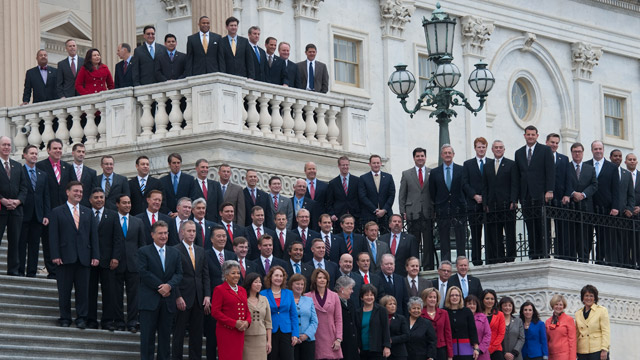BillMoyers.com is proud to collaborate with EveryVoice on a series of op-eds featuring ideas from a variety of viewpoints for making our democracy one that is truly of, by and for the people. Discover more ways to fight back against our broken campaign finance system. It’s a fight we can win.

Thanks to money in politics, Congress is disproportionately white and rich. (Photo by Douglas Graham/AP)

When Congress narrowly missed another government shutdown in December by passing the “cromnibus” bill, much of the press coverage focused on Capitol Hill’s ongoing dysfunction. However, buried inside the bill was yet another blow to campaign finance regulations, dramatically increasing the amount of money donors can give to political parties. A single couple can now give up to $3.1 million to a political party over a two-year election cycle, a six-fold increase.
Less than 1 percent of 1 percent of people have the means to take advantage of these eased rules, and therein lies the danger. This disparity means that most Americans lack the political capital to influence the policy decisions that affect their lives. As Demos’ foundational report Stacked Deck has shown, the priorities of those who can afford to write these large checks do not line up with the policy views and basic economic needs of the majority of Americans, such as restoring a strong minimum wage floor and adequately funding education. Indeed, wealthy interests are keenly focused on concerns, like keeping taxes low on capital gains, that are not shared by the rest of the American public and hinder broadly-shared prosperity.
Our latest investigation into the price we all pay for big donor dominance of elections reveals that people of color are vastly underrepresented in the donor class. This imbalance makes it easier for candidates for public office — of whatever race — to neglect the issues that matter to communities of color. It also means that people of color (who often lack access to donor networks) are less likely to run. When they do run, candidates of color raise just over half as much as their white counterparts. Ultimately, 90 percent of our elected leaders are white in a country where 37 percent of us are people of color. More than 1.2 million African-Americans in 175 communities across the country have councils that do not descriptively represent them. The very real effects of this can be seen in Ferguson, Missouri, where African-Americans make up about two-thirds of Ferguson’s population but hold just one of the six seats on its City Council.
The result is a range of policy outcomes that serve corporate interests and the donor class at the expense of most Americans, and especially communities of color. But there are clear solutions to put us on the path to a government that provides an equal say for all Americans.
One way to shift the balance of power is to amplify the voices of small donors in our system. Small-donor matching programs and other public funding systems like those in Maine, Arizona, Connecticut and New York City have been shown to increase participation, diversify the donor pool, and help more candidates of color run for office. At a federal level, the national Government by the People Act would increase the power of small contributions that ordinary citizens can afford to give by matching low-dollar donations with limited public funds. A recent Demos/US PIRG study of the 2014 midterms, The Money Chase, showed that if the Government by the People Act had been in place, a diverse group of credible candidates who lacked access to large donors but had grassroots financial support would have been better equipped to compete against their big money-backed opponents, and one (a Latina from California’s Central Valley) would have significantly outraised her opponent.
America holds on to an ideal that we all deserve an equal say over the decisions that shape our lives, regardless of race, gender or class. Yet, lax campaign finance rules are the latest way that we undermine this principle. When the interests of the few outweigh the well-being of the many, working families, middle-class families, and especially families of color suffer. The Government by the People Act, and the tremendous support that it has garnered, is evidence that we can put the diverse people of our nation, not just big donors, at the center of our democracy.


